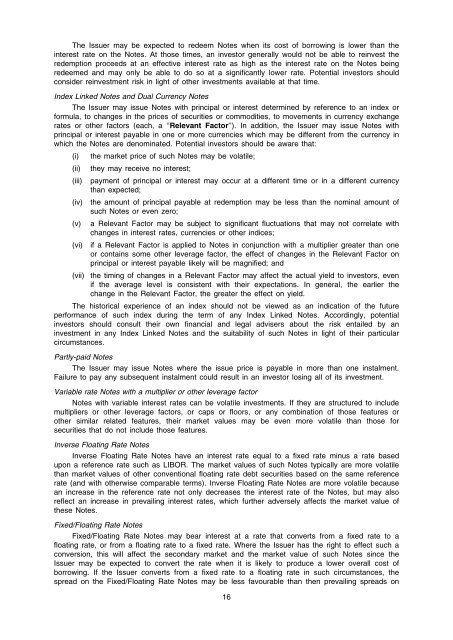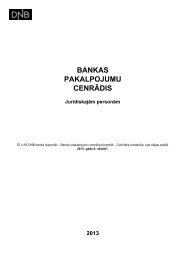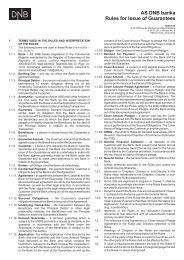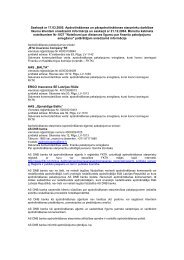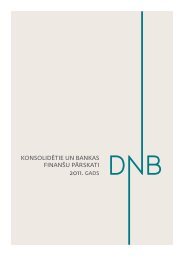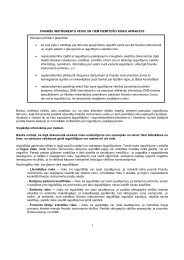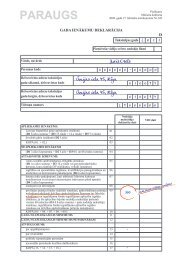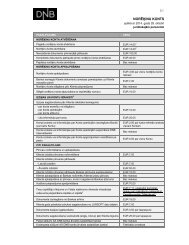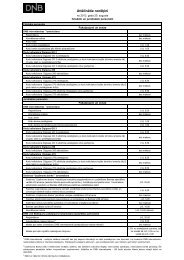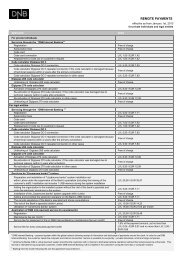Base Prospectus - Malta Financial Services Authority
Base Prospectus - Malta Financial Services Authority
Base Prospectus - Malta Financial Services Authority
Create successful ePaper yourself
Turn your PDF publications into a flip-book with our unique Google optimized e-Paper software.
The Issuer may be expected to redeem Notes when its cost of borrowing is lower than the<br />
interest rate on the Notes. At those times, an investor generally would not be able to reinvest the<br />
redemption proceeds at an effective interest rate as high as the interest rate on the Notes being<br />
redeemed and may only be able to do so at a significantly lower rate. Potential investors should<br />
consider reinvestment risk in light of other investments available at that time.<br />
Index Linked Notes and Dual Currency Notes<br />
The Issuer may issue Notes with principal or interest determined by reference to an index or<br />
formula, to changes in the prices of securities or commodities, to movements in currency exchange<br />
rates or other factors (each, a ‘‘Relevant Factor’’). In addition, the Issuer may issue Notes with<br />
principal or interest payable in one or more currencies which may be different from the currency in<br />
which the Notes are denominated. Potential investors should be aware that:<br />
(i) the market price of such Notes may be volatile;<br />
(ii) they may receive no interest;<br />
(iii) payment of principal or interest may occur at a different time or in a different currency<br />
than expected;<br />
(iv) the amount of principal payable at redemption may be less than the nominal amount of<br />
such Notes or even zero;<br />
(v) a Relevant Factor may be subject to significant fluctuations that may not correlate with<br />
changes in interest rates, currencies or other indices;<br />
(vi) if a Relevant Factor is applied to Notes in conjunction with a multiplier greater than one<br />
or contains some other leverage factor, the effect of changes in the Relevant Factor on<br />
principal or interest payable likely will be magnified; and<br />
(vii) the timing of changes in a Relevant Factor may affect the actual yield to investors, even<br />
if the average level is consistent with their expectations. In general, the earlier the<br />
change in the Relevant Factor, the greater the effect on yield.<br />
The historical experience of an index should not be viewed as an indication of the future<br />
performance of such index during the term of any Index Linked Notes. Accordingly, potential<br />
investors should consult their own financial and legal advisers about the risk entailed by an<br />
investment in any Index Linked Notes and the suitability of such Notes in light of their particular<br />
circumstances.<br />
Partly-paid Notes<br />
The Issuer may issue Notes where the issue price is payable in more than one instalment.<br />
Failure to pay any subsequent instalment could result in an investor losing all of its investment.<br />
Variable rate Notes with a multiplier or other leverage factor<br />
Notes with variable interest rates can be volatile investments. If they are structured to include<br />
multipliers or other leverage factors, or caps or floors, or any combination of those features or<br />
other similar related features, their market values may be even more volatile than those for<br />
securities that do not include those features.<br />
Inverse Floating Rate Notes<br />
Inverse Floating Rate Notes have an interest rate equal to a fixed rate minus a rate based<br />
upon a reference rate such as LIBOR. The market values of such Notes typically are more volatile<br />
than market values of other conventional floating rate debt securities based on the same reference<br />
rate (and with otherwise comparable terms). Inverse Floating Rate Notes are more volatile because<br />
an increase in the reference rate not only decreases the interest rate of the Notes, but may also<br />
reflect an increase in prevailing interest rates, which further adversely affects the market value of<br />
these Notes.<br />
Fixed/Floating Rate Notes<br />
Fixed/Floating Rate Notes may bear interest at a rate that converts from a fixed rate to a<br />
floating rate, or from a floating rate to a fixed rate. Where the Issuer has the right to effect such a<br />
conversion, this will affect the secondary market and the market value of such Notes since the<br />
Issuer may be expected to convert the rate when it is likely to produce a lower overall cost of<br />
borrowing. If the Issuer converts from a fixed rate to a floating rate in such circumstances, the<br />
spread on the Fixed/Floating Rate Notes may be less favourable than then prevailing spreads on<br />
16


